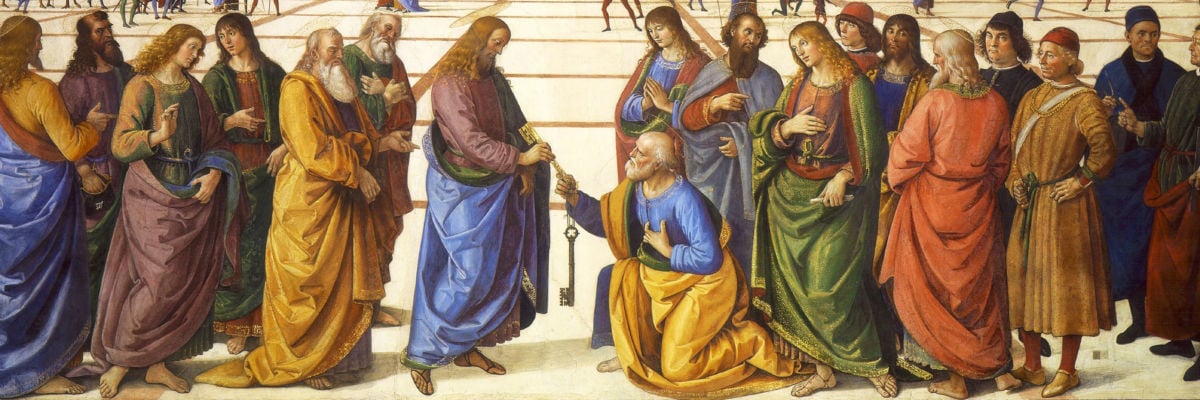
The go-to passage for many Catholics defending the papacy is Matthew 16:18: “And I tell you that you are Peter, and on this rock I will build my church.” But some Protestants argue that by “on this rock” Jesus wasn’t referring to Peter, but to something else. Joe Heschmeyer explains why this reading of scripture doesn’t make any sense.
Transcript:
Caller: In Matthew 16:8, where we as Catholics understand that Jesus was giving the seat of authority to Peter, I have Protestant relatives who say that when Jesus says “on this rock I will build my church,” that he was referring to himself, Jesus. How do we explain that to people who had that different interpretation?
Joe Heschmeyer: Thank you for the question! Is the rock Jesus, or is the rock Peter? I’d say a couple things.
The first thing—and I want to primarily cite some of the Protestant authors that I cite in the book—there’s a Southern Baptist preacher from the 19th century into the 20th century by the name of A.T. Robinson, who has a lot of, like, scriptural commentary and exegesis, and he gives kind of the characteristic Protestant examples. I’m giving this just for people who may not be familiar. And he says—Jesus makes a play on the name Peter, “rock,” and what he means there is, in Greek Jesus says “You are Peter [petros] and upon this rock [petra] I will build my church.”
There are a few things we’re gonna get to, like whether this was even originally Greek or not, but Protestants tend to say “Oh, this is a wordplay, and so it’s not clear…if Peter’s petros, who’s petra? And so Robinson says, “Well, maybe Jesus could mean himself by ‘this rock’ if he pointed to himself.”
And the first thing I’d say to that is: anytime you have to add the critical detail “if he pointed to himself,” you know you’re doing bad exegesis. Like, you could also say if he pointed to, like, a particular rock and said “This is where we’re gonna build,” then yeah, that would be a pretty important detail. But it rejects something about the authority of Scripture to say “The critical information to understand what was meant is something that we don’t even have access to.” Like, you know, “Jesus wants us to understand this passage, but we couldn’t possibly understand it because he didn’t give us the tools to, so we have to just imagine where he might have been pointing.” That’s really bad exegesis.
But there’s another reason, too. So this is actually from a Presbyterian minister by the name of Marvin Richardson Vincent, who says this reference of petra to Christ is forced and unnatural if you look at the passage. Here’s how it goes: they go up to Caesarea Philippi, which is far, far away from where they’ve been doing ministry for the entire rest of all of the Gospels. And so Jesus takes them, basically, on a retreat far away from everything else. And while he’s there he says to them, “Who do people say the Son of Man is?” and then he says, “Who do you say that I am?”
And one of them, Simon Peter, inspired by God, says, “You are the Christ, the Son of the Living God.” So Peter, Simon Peter, confesses Jesus as the Christ. In turn, Jesus says, “[Simon,] you are Peter, and upon this rock I will build my church…the gates of Hell will not prevail…[and] I will give you the keys of the kingdom of heaven…whatever you bind on earth will be bound in heaven, whatever you loose on earth will be loosed in heaven.”
So in other words, these things happen in this order: first of all, Peter confesses Jesus as the Christ; then Jesus confesses Simon as Peter; then he says that he’s going to build the church on the rock [petra], and then he personalizes it even more by giving the binding and loosing authority specifically to Peter, and giving him the keys to the kingdom of heaven.
So all of that is very explicitly to Peter. The idea that halfway in the middle of that he suddenly switches from talking to Peter to talking about himself, without any clear signal that he’s switching the target of the blessing—like, the form of this is a form of a blessing, and Peter’s a recipient of the blessing. The Protestant explanation that says “the rock is Jesus” turns it from Jesus blessing Peter to him switching blessing himself, or some third-party unnamed we-don’t-even-know-what-the-rock-is, and then going back to Peter. So when Marvin Richardson Vincent says this is forced and an unnatural exegesis, it’s true.
Jesus appears in the passage not as the foundation, but as the architect; “On this rock I will build,” so Jesus is present in this passage, but present as the architect of the Church, not the one upon which the Church is built. That’s the major point, I would say.
But there’s one more detail that’s really critical. Notice that this whole debate, “Who is the rock,” is premised on the idea that in Greek there’s this distinction between petros, the masculine form, and petra, which means “rock.” And so it’s like, “Oh, well this is a wordplay, and petros and petra, since it’s two different words, couldn’t mean the same person.” That’s a bad argument in the first place, but it’s a worse argument when you read John that the original name wasn’t petros in Greek, it was cepha in Aramaic. And that just means “rock,” so he just says “You are cepha, and upon this cepha Iwill build my church.”
So there’s only one referent. It’s “rock.” We know the word in Aramaic. He says “You are rock, and on this rock I’ll build my church.” And the only reason we lack that is because Greek is gendered in a way that Aramaic isn’t, and so Matthew has to translate it in a way that makes sense into Greek. He’s not creating a new separate referent, if that makes sense.
Caller: That makes a lot of sense, and I appreciate your going into so much detail.



